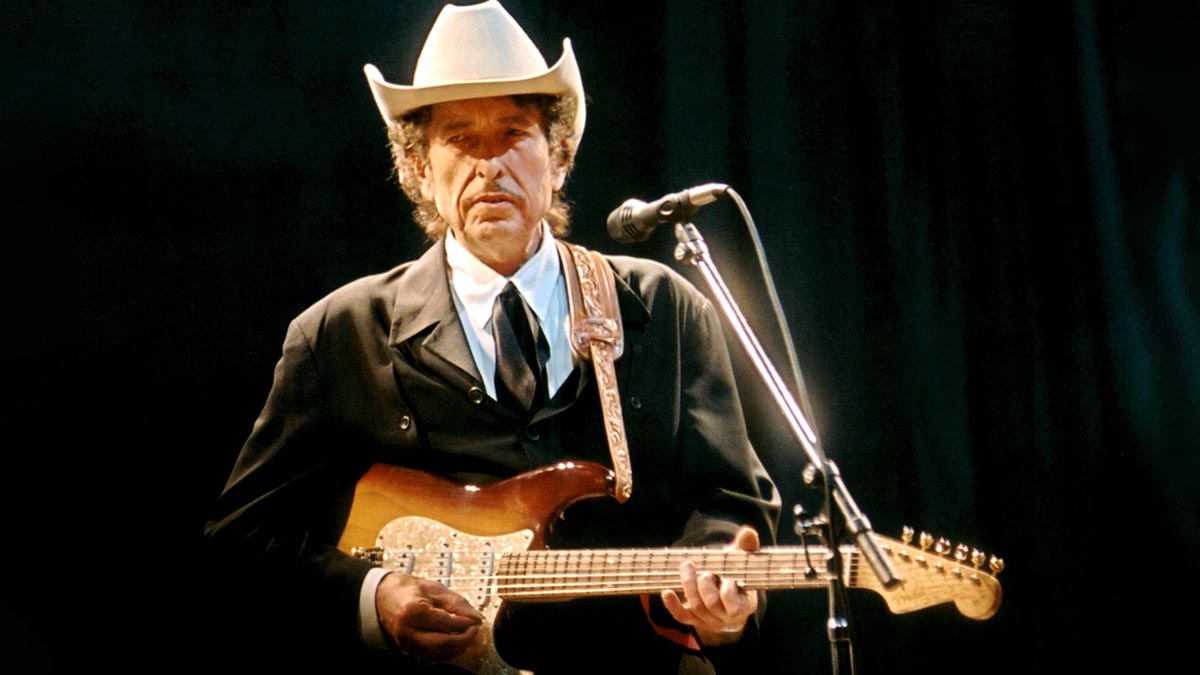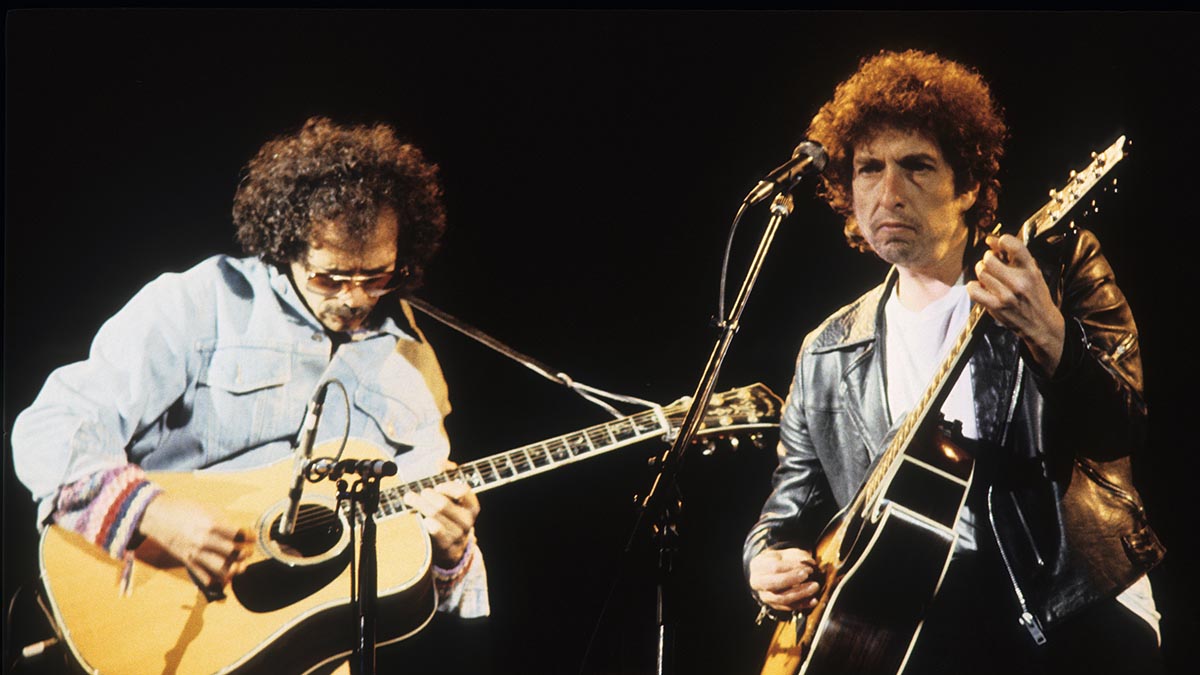5 songs guitarists need to hear by… Bob Dylan
Best of 2022: Here we celebrate an under-appreciated side of Dylan’s legacy and take a look at his greatest guitar moments, and how they shaped his peerless songwriting

Join us for our traditional look back at the stories and features that hit the spot in 2022
Best of 2022: Bob Dylan might not be the first name you think of when discussing guitar technique, but Dylan’s prolific and distinguished career has been peppered with some truly iconic moments.
From the very beginning, the guitar has been a central part of Dylan’s legacy, and it has shaped not only his songwriting, but forever changed the landscape of popular music.
It’s very easy to stop in 1969 when assessing Dylan’s work, but go a little further and there’s a treasure trove to be found. Dylan had, by 1970, already arguably made the first hip-hop single (Subterranean Homesick Blues), the first music video (with the same song) and practically invented modern songwriting (Like A Rolling Stone), and yet the story was (and is) far from over.
Whilst the bard himself may not be known as much of an axe slinger, he’s undeniably got an inimitable approach. Notable here is his occasionally wandering but idiosyncratic lead style, which he briefly touched on as being “mathematical” in his memoir Chronicles Vol.1. No further information was ever given, so whatever this “system” is remains a mystery.
Aside from that, he’s worked with some dazzling players, whether on record or as a part of the ever changing lineup of his backing band. With them, Dylan has revitalised and reinvented his catalogue constantly during the many years of his touring career.
To that end, he’s pulled in some of the best session players around, and still shows us night after night how channelling some creativity can still throw up surprises and curveballs after all these years.
Get the MusicRadar Newsletter
Want all the hottest music and gear news, reviews, deals, features and more, direct to your inbox? Sign up here.

Some of the most notable names in the pantheon of rock music have contributed to both his studio work and live performances, including Mark Knopfler, Eric Clapton and even Slash.
But that’s not the whole story, and Dylan’s own playing has produced some standout moments. With a career spanning over six decades, this is a spit in the wind, but let’s dive in…
Cold Irons Bound – Masked & Anonymous: Music From The Motion Picture (2003)
Originally released on the ethereal, dark and brooding Time Out of Mind in 1997, Dylan reworked Cold Irons for the soundtrack of his 2003 movie Masked & Anonymous, backed by a formidable touring band that included guitarists Larry Campbell and Charlie Sexton. Both respected session players, they weave deceptively simple licks together to form something truly greater than the sum of their parts.
A shining example of playing to the song, and with remarkably clean tones, Sexton and Campbell end up providing what feels like the soundtrack to the apocalypse. It was around this time that Sexton would likely have employed the eponymously named Sex Drive, a clean boost with added bottom and sustain developed with Durham Electronics. Just goes to show that tonal simplicity with a great arrangement can bring all the power you need.
Man In the Long Black Coat – Oh Mercy (1989)
With Daniel Lanois at the producing helm, it’s no surprise that this is a near perfect example of the guitar being used as an instrument of atmosphere above anything else. Lanois’ use of lush reverbs and sublime delay turns this track into a dark cinematic odyssey of America’s south.
Never flashy or over the top, the guitar is used here as a textural element, with tasteful flourishes highlighting lyrical phrasing. There are other examples of this approach to guitar on the album, which are as much a lesson in production as they are technique, but this one stands above them all.
Don’t Think Twice, It’s Alright – The Freewheelin’ Bob Dylan (1963)
It would be downright wrong to not include a dip into the 60s, and this stands out as proof of Bob’s chops as a fingerpicker. Whilst there are those that have attributed the guitar part on this track to Bruce Langhorn, the overwhelming evidence suggests it’s Bob behind the melodic, propellant picking on this track.
A great example of deft, tuneful country folk, in fact it’s something of a masterclass. Many players around the time were certainly capable of more technical playing, but as service to the song it’s spot on, and deceptively difficult to nail. Dylan wears his influences clearly here, but produces a perfect example of the genre he was about to leave in the dust. As a practice piece it’s a superb example of rhythmic fingerpicking.
Dark Eyes – Empire Burlesque (1985)
Dylan was thought to have struggled in the 80s, although that’s a concept largely rebuffed by the recent Springtime In New York entry into the bootleg series. On an album largely awash with mid-decade production sheen, this is a stripped back acoustic number that many see as a highlight of the album.
It’s a step back to his purist folk roots, and much like the last entry on this list is a testament to his skill as both a songwriter and guitarist. Playing with chord inversions, the guitar work underpins a beautiful lament of a song, allegedly written about a sex-worker he passed in a hallway of the Plaza Hotel in New York. Dark Eyes is pure inspiration for exploring interesting chord shapes, as well as developing left hand dexterity. It’s also a great song.
Thunder On The Mountain – Modern Times (2006)
Dylan’s first number one album since 1976 opens with a statement of intent. The rollicking opening track is a love letter to the trailblazing rock-n-rollers of the 50s that he’d have heard on the radio growing up.
Dylan has frequently included 12-bar blues tunes on his records, but on this occasion he elevates it to a locomotive shuffle interspersed with some inspired vintage licks from guitarists Denny Freeman and Stu Kimball.
The DNA of Sun Records shines through, and Dylan is clearly letting his sidemen have some fun, without falling into cliche or parody. Reinventing the wheel it may be, but it sounds like one hell of a good time.
“Every note counts and fits perfectly”: Kirk Hammett names his best Metallica solo – and no, it’s not One or Master Of Puppets
“I can write anything... Just tell me what you want. You want death metal in C? Okay, here it is. A little country and western? Reggae, blues, whatever”: Yngwie Malmsteen on classical epiphanies, modern art and why he embraces the cliff edge









